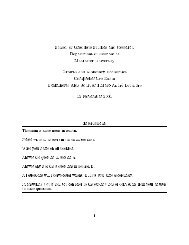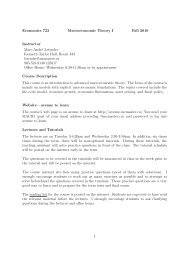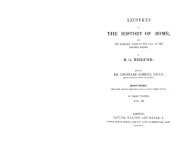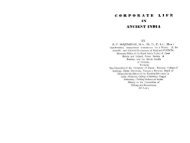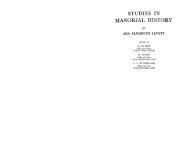L<strong>an</strong>castri<strong>an</strong>successes.shared the fate of Alnwick but for the promptness withwhich Warwick sent his brother RIontague to defend it. InJune, Henry, Margaret, <strong>an</strong>d De BrCzC were together inBamburgh1. But in that very month Warwick himselfwas again sent to the North2; the L<strong>an</strong>castri<strong>an</strong>s dispersedonce more, <strong>an</strong>d Margaret retired to Scotl<strong>an</strong>d, closely pursuedby Warwick3. About Christmas Somerset returnedto his allegi<strong>an</strong>ce4. Early in 1464 the castles of Norham<strong>an</strong>d Skipton in Craven were captured by the L<strong>an</strong>castri<strong>an</strong>s5,<strong>an</strong>d a rising took place in L<strong>an</strong>cashire <strong>an</strong>d Cheshire,Fatal over always a stronghold of the partyG. But all their hopesthrow.were overthrown by the crushing defeats inflicted on themby Warwick's brother Montague in the battles of HedgeleyMoor, April qth, <strong>an</strong>d Hexham, May 8th, 14647. Somcrset,Hungerford, <strong>an</strong>d other prominent L<strong>an</strong>castri<strong>an</strong>s weretaken <strong>an</strong>d beheaded. Henry, who seems to have beellawaiting the issue of the field in Bywell Castle, escapedthence, no one knew how or whither, but ultimately toScotl<strong>an</strong>d S. In June Alnwick <strong>an</strong>d Dunst<strong>an</strong>burgh surrenderedto Warwick, <strong>an</strong>d Barnburgh was taken by assaultq.fixed by a letter printed in Dupont's wick was in great force at New-Waurin, iii. 159-161, which shows castle, <strong>an</strong>d intending to go forthatthe news of it reached London wards to Scotl<strong>an</strong>d ; that De Brkzk,on May 31, 1463. Dr. Stubbs Grey, <strong>an</strong>d others had been besieg-(C. H. iii. 199) places the recovery ing a castle near Alnwick, but hadof the castles in 1464 ; but though retired on the approach of Monta-Worcester seems to place the gue ; that Edward had left Lonrecoveryof Alnwick immediately don on the pretious Thursdaybefore the battle of Hexham, a week (July 7th), intending to follomwhole leaf of the MS. is missing War~vick in force ; Waurin,~. S.,<strong>between</strong> the two occurrences. <strong>The</strong> iii. 162-4.letter cited above is quite conclu- Waurin, ii.319-321. This theresive.fore would be in July ; see last note.l On all this see Waurin, U. S. ' Gregory, p. 223 ; Three Chron.'After Pentecost,' says Three p. 177. Warlzworth (p. 3) placesChron.pp. 176-7. Whit-Sunday in Somerset's return 'half a year1463 was on May 29th. In Rymer, after his original defection.xi. 501, there is a commission, "Three Chron. p. 178.dated June 2, to Warwick <strong>an</strong>d Paston Letters, ii. 152.others to array the men cf West- 'Cf. Rot. Parl. v. 51 I f.morel<strong>an</strong>d against the king's foreign Three Chron. p. 179. M<strong>an</strong>yenemies who have been stirred up thought that he was dead ; ChasbyHenry, late king d. ftrcto. A tellain, v. 22.letter written on Saturday, July Three Chron. p. 179 ; Wor-15th, 1463 (?!6th, July I 5th in 1463 cester, pp. 782-3 ; notes to Warkwason a Friday), says that War- worth, pp. 36-9.But almost a year before the final blow fell, Margaret Marbaret<strong>an</strong>d her son, with De BrCzC, Fortescue, <strong>an</strong>d others in her ;idt:yg"train, had quitted Britain for the Continent. It must Continent.have been just after the dispersal of the L<strong>an</strong>castri<strong>an</strong>s inthe summer of 1463 that they set forth l, for it was in thelast days of July that they l<strong>an</strong>ded at Sluys. <strong>The</strong>y were inextreme poverty, <strong>an</strong>d dependent on the liberality of DeBrCzC for the very bread they ate2. From Sluys RIargaretdespatched a messenger to the Duke of Burgundy, whowas superintending the negotiations which were going onat St. Omer <strong>between</strong> the French <strong>an</strong>d English, to beg for apersonal interview with him. From this the Duke triedto excuse himself, but ultimately, with the magnificentcourtesy which characterized him, yielded to Margaret'simportunity. On her way to join him she was met byCharles the RoId at Bruges, who lent her money to supplyher w<strong>an</strong>ts. Here she left her son <strong>an</strong>d all her household,Fortesc~e no doubt among them, <strong>an</strong>d proceeded on herl <strong>The</strong>Englishauthoritiesareveryobscure as to the timeofMargaret'sdeparture for Fl<strong>an</strong>ders. It seemscommonly assumed that it was aconsequenceofthedefeats ofHedgeley<strong>an</strong>d Hexham. But the briefLatin Chronicle (Three Chron. pp.1 79 f.) clearly places it before thoseevents,forafterrelatingthern it says:' Margareta has procellas prrcave?zs,incolaelegitfieri tr<strong>an</strong>smarina.'And it may well have been thoughtdesirable to place the heir of L<strong>an</strong>casterin safety before the die wascast. All the foreign authorities,Chastellain, Waurin, Monstrelet,Duclerq, place Margaret's arrivalin Fl<strong>an</strong>ders in 1463, <strong>an</strong>d so doesWorcester (p. 781), though themonth he gives, April, is too early.Dr. Stubbs, citing Worcester,represents Margaret as goingabroad early in 1463 <strong>an</strong>d returningtowards the end of that year.But Worcester clearly refers to thefinal departure of Margaret, for hespeaks of her settling in her father'sdominions, ' ut ibi expectareteventus mundi.' Worcester moreovermakes her embark at Bamburgh.We have seen that Henry,Margaret, <strong>an</strong>d De Br6zC werethere in June 1463, but the foreignauthorities, especially Waurin, ii.319 ff., clearly represent them asretiring to Scotl<strong>an</strong>d, where theirpresence seems to have been nolonger welcome ; cf. Basin, ii. 50 ;Chastellain, iv. 279 ; vii. 103. Itwould seem that it is to this periodthat we must refer the rom<strong>an</strong>ticstory of hlargaret's adventure withthe robber, which she told theDuchess of Bourbon at St.Pol; seebelow,, p. 64. From this point tothearnval ofPrlargaret at St.Mighe1in Barrois, I follow almost exclusivelythe authority of Chastellain,whose narrative is most minute,<strong>an</strong>d whose position enabled himto obtain the most exact information.Compare also Monstrelet,iii. f. 96 a ; Duclerq, Liv. v. ch. I ;Basin, ii. 50. Gregory, pp. 220-1,is very confused.Vhastellain, iv. 279.
Illterview way alone. At Bdthune the English made <strong>an</strong> attempt tow~th Philip8- capture her ; but they were too late, <strong>an</strong>d on August 31stSU~~Y. she reached St. Pol in safety, where she was to await theDuke, who arrived the following day, <strong>an</strong>d entertained hermagnificently <strong>an</strong>d gave her m<strong>an</strong>y comfortable words1.<strong>The</strong> next day, September znd, the Duke departed, leavinghis guest to the care of his sister the Duchess of Bourbon,whom Margaret entertained with the recital of her adventures.After his departure the Dcllte sent back a knightwith a present of 2,000 gold crowns <strong>an</strong>d a rich diamond forMargaret, <strong>an</strong>d other presents for her attend<strong>an</strong>ts2. <strong>The</strong>following morning, September grd, Margaret departed fromSt. Pol <strong>an</strong>d returned to Bruges, escorted by a body-guardof the Duke's archers, to prevent her falling into the h<strong>an</strong>dsof the English. At Brugcs she found not only Charles theBold, but also the Bastard of Burgundy <strong>an</strong>d Philip deCrhvecceur <strong>an</strong>d others. And in the entertainments thatfollowed there was much stately conflict on points ofetiquette, Charles insisting with somewhat ostentatiouschivalry on treating his guests in accord<strong>an</strong>ce with theirformer r<strong>an</strong>k, <strong>an</strong>d not according to their present condition 3.<strong>The</strong> L<strong>an</strong>- From Rruges Margaret <strong>an</strong>d her followers were conveyedcaqt~i<strong>an</strong>,,- under Burgundi<strong>an</strong> protection to the borders of Bar, wheretlreto they were received by <strong>an</strong> escort sent by Margaret's father4,St. Mighel. who assigned them as their residence the little town ofSt. Mighel in Barrois. Here they lived the usual life ofexiles, in great poverty 5, carrying on a feeble agitation atsuch foreign courts as they had access to, but sometimes insuch straits for money that they could hardly pay aNegotia- messenger to go on their err<strong>an</strong>ds \ Louis XI was const<strong>an</strong>tlyapplied to. In 1464~, <strong>an</strong>d again in the summer ofChastellain, iv. 280-6, 293-4. Here highnesse may do no moreIb. 298-9, 307 ; cf. Com- to us th<strong>an</strong>ne she dothe ;' Fortescuemynes, 6d. Lenglet-Dufresnoy, ii. to the Earl of Ormond. FalnllyI 78. History, p. 72.S Chastellain, iv. 309-314.'<strong>The</strong> berer hereof had of us' Ib. 332 ; vii. 105.but iij scutes for alle his costes' We buthe alle in grete towardes you, by cause we haddepoverte, but yet the quene sustey- no more money ;' ib.nethe us in mete <strong>an</strong>d drlnke, so as In the same letter Fortescuewe buthe not in extreme necessite. speaks of having been at Paris ;146j, Fortescue himself went to Paris. On the latter occasionhe was accomp<strong>an</strong>ied by the Earl of Pembroke, HenryVI's half-brother, <strong>an</strong>d was the bearer of a letter fromHenry V1 to Louis XI, dated Edinburgh, March 28th(? 1 ~6~)~. <strong>The</strong>ir chief hope however was in the kings ofPortugal <strong>an</strong>d Castile <strong>an</strong>d in Charles the Bold, because oftheir connexion with the house of L<strong>an</strong>caster. It washoped that the first-named king would influence theEmperor Frederick I11 who had married his sister, <strong>an</strong>dthat the Emperor would bring pressure to bear on thePope2. <strong>The</strong> (titular) Earl of Ormonde, who had fled toPortugal after Towton, was now acting as L<strong>an</strong>castri<strong>an</strong>ambassador at that court. It is from a letter of Fortescueto him, enclosing instructions from the Queen <strong>an</strong>d lettersfrom the Prince, that we learn most of the particulars givenabove 3. This letter was written in December 1464. In Fate~fthe instructions it is stated that Henry is well <strong>an</strong>d out of Henryv1-the h<strong>an</strong>ds of his rebels, <strong>an</strong>d we have seen that in thefollowing March he perhaps dated a letter from Edinburgh.But soon after this he must have left Scotl<strong>an</strong>d, which inthe previous year had concluded a truce for fifteen yearswith Edward ; <strong>an</strong>d early in July *, while w<strong>an</strong>dering inL<strong>an</strong>cashire atnong his secret friends, he was betrayed <strong>an</strong>dib. 71. In the De Lazm'i6z~s, c. 53, VII. xxxvii ; Maitl<strong>an</strong>d's History ofFortescue alludes to a recent so- Edinburgh, p: 8. In March 1464journinParis,butwhetheritwasthis he was certainly at Bamburgh ;oralater one c<strong>an</strong>notbe determined. Waurin, iii. 183. After Hexhaml Printed by Lord Clermont, he probably returned to Scotl<strong>an</strong>d,U. S. p. 78. More correctly by <strong>an</strong>d if we may accept Lord Cler-Dupont, U. S. iii. 169 f., who how- mont's date for this letter he wasever assigns it to the year 1462, at Edinburgh in March 1465.v. S. p. 59, zotes. Henry's move- Instructions to Ormond, U. S.ments at this time are wrapped in p. 74.mystery. We have seen (p. 62) <strong>The</strong>se documents are giventhat in July 1463 he retired to by Lord Clermont, U. S. pp. 69-75,Scotl<strong>an</strong>d, where Margaret left him. but he is mistaken in thinking thatMonstrelet <strong>an</strong>d Duclerq (U. S.) re- none of them have been printedpresent him as being in a strong before. <strong>The</strong> letters of Princeplace, 'ou pays de Galles' (?Gal- Edward <strong>an</strong>d of Fortescue are inloway), during her visit toFl<strong>an</strong>ders. the Arch~ological Journal, vii. I 70;Chastellain, iv. 279, merely says cf. Foss, Judges, iv. 313.that she left him in a secure place. " <strong>The</strong> date given by most au-In J<strong>an</strong>. 1464 he seems to have thorities is 'about the feast of SS.been at Edinburgh ; Exch. Rolls, Peter <strong>an</strong>d Paul,' i. e. June zg.F
- Page 1 and 2: OTHER WISE CALLEDThe Difference bet
- Page 3 and 4: THE work here presented to the read
- Page 5 and 6: preface. preface, xihistorical bear
- Page 7 and 8: NOTE.-AS a general rule the authori
- Page 9 and 10: xviii CLbconological Cable, QLbrono
- Page 11 and 12: INTRODUCTION.PART I.TIIE fifteenth
- Page 13 and 14: Key-note ' The key-note of the Lanc
- Page 15 and 16: 3(n troduction,His reign only as de
- Page 17 and 18: directed, and they must therefore b
- Page 19 and 20: crimes from punishment'. This evil,
- Page 21 and 22: Perversionof justice.Localoffice1 S
- Page 23 and 24: Influence use their local power to
- Page 25 and 26: houses of Parliament an oath agains
- Page 27 and 28: Tumber of action lay1. One cause of
- Page 29 and 30: The House been judged in history fo
- Page 31 and 32: does not involve the acquittal of t
- Page 33 and 34: life as ahnrrister.become possessed
- Page 35 and 36: ford Castle a prisoner named Thomas
- Page 37 and 38: Anarbitra- Wentworth and Sir John F
- Page 39 and 40: The Lancastriansretirenorthwards.Ag
- Page 41: which they said was ruining the cou
- Page 45 and 46: feelings the exiles received the ne
- Page 47 and 48: Requiredto write infavour ofthe Yor
- Page 49 and 50: Other come down to us for the most
- Page 51 and 52: And moche good truly gotyn hath bee
- Page 53 and 54: Date.The DeI.arrcfi6usLegurnA uglii
- Page 55 and 56: The RIS. is well and correctly writ
- Page 57 and 58: cording to Mr. Thompson, is of the
- Page 59 and 60: I'robably On the whole, the second
- Page 61 and 62: Aquinas, six I have failed to trace
- Page 63: Fortescue'scontemporaries.Littleton
- Page 66 and 67: sithpn thai had a kynge, wich was G
- Page 68 and 69: that cause and for gret necessite w
- Page 70 and 71: such meane. And yet of necessite th
- Page 72 and 73: and sqviers, and oper, in also gret
- Page 74 and 75: or by lande, pe kyng most encomptre
- Page 76 and 77: grettest lordes off Englond, rose a
- Page 78 and 79: as hynl liste. And by discente per
- Page 80 and 81: haue wherwith to bie hem bowes, arr
- Page 82 and 83: Ther is no man hanged in Scotlande
- Page 84 and 85: e kyng be counsellyd to restrayne g
- Page 86 and 87: pe Romans, but also is hyghnes shal
- Page 88 and 89: muned and del~bered with his fforsa
- Page 90 and 91: CRITICAL NOTES.CHAPTER I.P. 109. 1.
- Page 92 and 93:
Bfbe bobernance of QEnfiian'tr,CHAP
- Page 94 and 95:
1. 24. parcial] parcialite L (from
- Page 96 and 97:
for granting taxes was the same as
- Page 98 and 99:
moral philosophy, but consists of a
- Page 100 and 101:
are brought about by the sin of man
- Page 102 and 103:
note$+ QLbap. ii,regendo: non autem
- Page 104 and 105:
note$+ CCbap, ii,up in the most une
- Page 106 and 107:
Later statutes fixed the limit of l
- Page 108 and 109:
&be bobernanre of QEngIanD*applied
- Page 110 and 111:
of the household of George Duke of
- Page 112 and 113:
RgidiusRumanus.. . . homines sibi s
- Page 114 and 115:
note see Janet, i. 35 1-373, 396,42
- Page 116 and 117:
'Ordinaryand extraordinaryexpenditu
- Page 118 and 119:
p----p---3723ESTIMATED EXPENDITURE.
- Page 120 and 121:
pestifera.' Very possibly Fortescue
- Page 122 and 123:
i the clerkys off theschekquer.] Be
- Page 124 and 125:
eciting how 'the seid Duc . . . lat
- Page 126 and 127:
was defined by Parliament in 4 Edwa
- Page 128 and 129:
punish ' piratas et spoliatores mer
- Page 130 and 131:
marchandyse is lost, . . . the see
- Page 132 and 133:
Transition pensiononmg, as it was d
- Page 135 and 136:
@Lbap+ bii,commiscomissioners in gr
- Page 137 and 138:
ap1-0,Bterc,cjzt4IjAnd on the other
- Page 139 and 140:
Charleshlartel.Fall of theCarolingi
- Page 141 and 142:
the Abbey of S. Albons' (July: Past
- Page 143 and 144:
York, married Constance and Isabell
- Page 145 and 146:
Taxon France, ii. 526, 533-4, 547,
- Page 147 and 148:
499 b). And no less than ~o,ooo mar
- Page 149 and 150:
which was probably in Fortescue's m
- Page 151 and 152:
holders of such grants are however
- Page 153 and 154:
286 Cbe Booernance of Qngianb.exter
- Page 155 and 156:
teristic of the Lancastrian times,
- Page 157 and 158:
such a contenuall counsell.] ' The
- Page 159 and 160:
character which the council might p
- Page 161 and 162:
which can not counsele hym' (Append
- Page 163 and 164:
306 &be bobernance of QEnglanD.'whe
- Page 165 and 166:
Sicque horum mediis concessit tande
- Page 167 and 168:
Ebe bobernance of QEngland.qualific
- Page 169 and 170:
Controlof the exchanges.Jealousyof
- Page 171 and 172:
during good behaviour. The Master o
- Page 173 and 174:
Cbe Qiobernance of QEngIand,says: '
- Page 175 and 176:
should be Justice, Chamberlain, Cha
- Page 177 and 178:
Offices per- system of executing of
- Page 179 and 180:
Defined by (e.g. Rot. Parl. v. 2 73
- Page 181 and 182:
have been detailed in the notes to
- Page 183 and 184:
of Sir Harris Nicolas there). This
- Page 185 and 186:
iiij. lordis temporelx, or in lasse
- Page 187 and 188:
y a pretensed title, saying he ys d
- Page 189 and 190:
'every broker, brogger, andhuckster
- Page 191 and 192:
suffre, suffer, 152. 14 ; soeffre,
- Page 193 and 194:
Cade, rising of, pp. 11, 284; hisco
- Page 195 and 196:
~ .-.~--hopes entertained of him, p
- Page 197 and 198:
Franchise, question of, in medizval
- Page 199 and 200:
Loans raised by the government,pp.
- Page 201:
Pisa, Council of, p. 243. .Pitt, se



